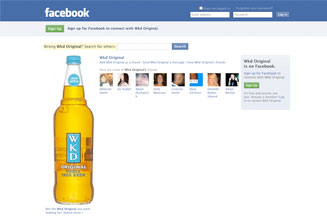
The digital marketing of alcohol brands has sparked a moral panic, and an army of NGOs, consumer groups and politicians is assembling with the aim of restricting these promotional efforts.
A British Medical Association report, 'Under the Influence: the damaging effect of alcohol marketing on young people', written by controversial academic Gerard Hastings, sets out this coalition's view in detail. In it, Hastings implies that the 'fragmented media marketplace' is something to be feared. He goes on to ask: 'How many parents know what advertising is reaching their children through social networking sites like Facebook or Bebo?'
MPs on the health select committee investigating alcohol abuse have raised similar questions during evidence-gathering sessions in the past few months. Digital agencies with drinks brand clients were hauled over the coals by committee members who voiced suspicion about the nature of their work.
The release last week of a set of guidelines by drinks industry body the Portman Group, entitled 'Responsible Marketing of Alcoholic Drinks in Digital Media', is therefore timely.
The document brings together relevant points from the Committee of Advertising Practice (CAP) Code and the Portman Group's own rules, which govern advertising and alcohol brand activity in different areas. Although the codes were already in force, they have never been collated in this way and applied directly to all the emerging forms of digital marketing.
'We feel that the digital arena is growing so fast that, while it offers many opportunities, it also presents dilemmas for drinks marketers,' says David Poley, chief executive of the Portman Group. 'Therefore, we felt it was appropriate to draw up something like this.'
The guidelines deal very fully with all the areas to which they refer. Everything from corporate and brand websites through to user-generated content and social-networking sites are placed under the spotlight. At times the guidelines can seem overly forensic, but given the heavy scrutiny the marketing of drinks brands receives, this is probably no bad thing.
A complaint from Alcohol Concern last year to the Portman Group illustrates the minefield created by developments in the dig-ital arena. The pressure group took issue with a WKD website featuring pictures of party-goers at an event held by the Beverage Brands-owned alcopop. The Portman Group's Independent Complaints Panel upheld the objections that some of the people appeared to be younger than 25, while others looked intoxicated and some images suggested a link between WKD and social success - all of which contravene the group's code.
The case demonstrated that, while drinks brands are usually clear on what is suitable for use in advertising, ambiguity remains in relation to how real consumers should be treated in the digital space. Nonetheless, the alcohol industry leads other advertisers in this area. While the Portman Group has taken responsibility for alcohol brands' websites, in other sectors these are unregulated as they sit outside the CAP remit. The Advertising Association has been trying to resolve this for more than a year but has been unable to find a model that keeps all parties happy.
Poley hopes that rather than restricting activity, the guidelines will encourage marketers to promote their brands online. 'There are areas where companies have been hesitant to tread because they have not known what is responsible practice,' he says.
As marketing communications partner at Molson Coors, Rob Salmon is responsible for the drinks company's digital activity. He sat on the steering group that oversaw the creation of the guidelines and says 'they are about giving practical advice in a complex area and providing a useful resource for a marketing department'. He is planning an event to explain the advice to Molson Coors' marketing department and the agencies it employs.
The steering group, which includes representatives from Beverage Brands and Diageo, will now continue to meet on an ad hoc basis to review how the guidelines are operating in the light of the latest digital innovations.
There are some groups that will always ask for additional restrictions on the freedom of drinks manufacturers to market their products. However, initiatives such as these guidelines will not only prove useful for marketers, but also provide a solid defence against further limitations and unfounded criticism of the industry.


